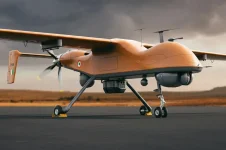- Views: 3K
- Replies: 3

The Indian Institute of Technology (IIT) Kanpur has achieved a breakthrough in defence technology with the development of an indigenous "suicide drone" designed specifically for the Indian Army.
This advanced unmanned aerial vehicle (UAV), dubbed a 'swadeshi' version of the Kamikaze drone, is capable of identifying and eliminating enemy targets, including tanks, weapons, and personnel, within minutes.
Developed over two and a half years by IIT Kanpur's Aerospace Engineering Department, this cutting-edge drone boasts a carrying capacity of up to 2 kilograms and an operational range of at least 100 kilometers, extendable based on mission requirements.
Professor Subramanyam Saderla, who led the development team, highlighted the drone's impressive speed capabilities, with operational speeds of 35-40 kilometers per hour and a potential maximum speed of 180 kilometers per hour. This makes it a significant addition to the Indian military's arsenal, offering a level of capability not previously available.
The drone operates on a rechargeable system, providing an endurance of 3 to 4 hours per charge. Equipped with infrared sensors and GPS, it offers real-time, precise location data for enemy targets, enabling long-range identification and tracking.
Despite its advanced features, the drone operates silently, enhancing its stealth capabilities. It can also capture high-quality photos and videos, making it a valuable asset for reconnaissance missions.
IIT Kanpur anticipates significant interest in this technology, projecting a revenue goal of Rs 1,500 crore within the next five years. Professor Saderla emphasized the drone's "suicide" function, meaning it can strike targets autonomously while remaining under the complete control of the Army, with the option for operators to destroy it remotely if necessary.
This development comes at a time when Defence Minister Rajnath Singh is emphasizing India's goal of becoming a hub for drone technology. Singh recently visited IIT Kanpur and witnessed a demonstration of the drone, expressing his appreciation for its potential in national defence.
This isn't the first drone innovation from IIT Kanpur. The institute previously unveiled "Maral," a groundbreaking solar-powered drone designed for aerial surveillance. Maral's integrated solar panels allow for extended flight times and reduced reliance on traditional fuels, setting new standards in sustainable monitoring technology.
Kamikaze drones, also known as loitering munitions, have become increasingly prevalent in modern warfare, notably in the Russia-Ukraine war and the Israel-Hamas conflict. With this indigenous development, India strengthens its defence capabilities and takes a significant step towards self-reliance in drone technology.




